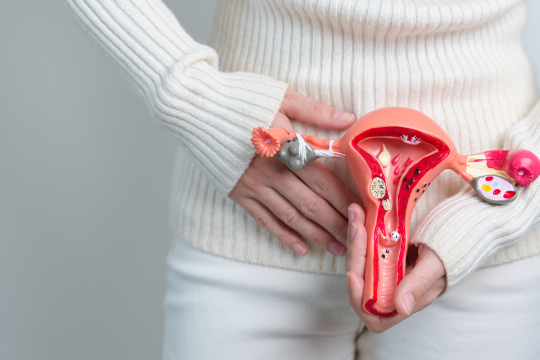July 5, 2024
Fibroid Symptoms: 8 Signs to Watch For and Treatment Options
Are you experiencing unusual symptoms and wondering if fibroids might be the cause? You’re not alone. Understanding fibroid symptoms and knowing when to seek medical advice is crucial for maintaining your health. Let’s explore what fibroids are, the symptoms to watch for, and the treatment options available.
What are Fibroids?
Fibroids, or uterine leiomyomas or myomas, are non-cancerous growths in or on the uterus. They can vary in size from as small as a pea to as large as a grapefruit. While fibroids are common, many women may not know they have them because the symptoms can be easily overlooked.
8 Common Fibroid Symptoms
Keep an eye out for these tell-tale signs:
- Heavy or prolonged menstrual bleeding
- Pelvic pain or pressure
- Pain during intercourse
- Frequent urination
- Constipation
- Backache or leg pains
- Enlarged uterus or abdomen
- Fertility issues
Heavy or Excessive Menstrual Bleeding
Fibroids might be the culprit if you change your pad or tampon more frequently.
Pelvic Pain or Pressure
Persistent discomfort in your lower abdomen could indicate the presence of fibroids.
Pain During Sex
Are you experiencing pain during intercourse? Fibroids could be the reason.
Frequent Urination or Constipation
Fibroids pressing against your bladder or intestines can cause these uncomfortable symptoms.
Enlarged Uterus or Abdomen
Sometimes, fibroids can make your uterus grow more prominent, causing a swollen appearance or a full feeling in your lower abdomen.
Fertility Issues
In some cases, fibroids can interfere with conception or carry a pregnancy to term.
Why Early Detection Matters
Diagnosing and treatment of fibroids can make a world of difference. Early detection allows for:
- Better management of symptoms
- More treatment options
- Reduced risk of complications
- Improved fertility outcomes
Fibroid Treatment Options
Your treatment plan will depend on your symptoms, the size and location of your fibroids, and your personal health goals. Options include:
Medications
Certain drugs can help manage symptoms like heavy bleeding and pelvic pain. These may include:
- Hormonal birth control
- Gonadotropin-releasing hormone (GnRH) agonists
- Tranexamic acid
- Progestin containing IUDs
- Uterine Artery Embolization (UAE): Cuts off blood supply to fibroids
- Laparoscopic Myomectomy: Removes fibroids through small incisions
- Hysterscopic Myomectomy- if fibroids protrude into endometrial cavity, they can be removed through a hysteroscope
Surgical Procedures
Abdominal Myomectomy: remove fibroids through abdominal incision.
Hysterectomy- remove uterus through abdominal incision or a laprascopic incision.
When to See a Doctor
Experiencing any of these symptoms? Don’t wait. Please book an appointment with our team today. Call us at 706-227-8999 to discuss your symptoms and find a solution that works for you. Your doctor might perform:
- A physical exam
- An ultrasound
- An MRI
- Other tests to determine if you have fibroids and discuss the best treatment options.
FAQs About Fibroids
Can fibroids turn into cancer?
Fibroids are almost always benign. The risk of a fibroid being cancerous is less than 1 in 1,000.
- Do fibroids need to be removed?
Only sometimes. If fibroids are not causing symptoms, your doctor may recommend “watchful waiting.”
Can fibroids affect fertility?
In some cases, yes. However, many women with fibroids can still conceive and have healthy pregnancies.
What age do fibroids typically develop?
Fibroids most commonly develop in women between the ages of 30 and 50.
Lifestyle Changes to Manage Fibroid Symptoms
While not a cure, these changes may help manage symptoms:
- Maintaining a healthy weight
- Eating a balanced diet rich in fruits and vegetables
- Regular exercise
- Stress management techniques like yoga or meditation
At the Women’s Center of Athens, we help you navigate your health concerns. Don’t let fibroid symptoms control your life. Take charge of your well-being today.
Ready to address your fibroid symptoms? Book an appointment now! 706-227-8999
For more information about fibroids and other women’s health issues, visit our related pages on women’s health check-ups, menstrual health, and fertility.
Remember, recognizing the signs of fibroids is the first step to managing your health. Stay informed and proactive about your well-being.
Category:
Book Appointment
For new patients, call us to find a convenient appointment time or use our online Patient Portal to request an appointment.
Categories
Stay Connected with Our Community
Join us on Instagram for the latest updates, health tips, and a peek into our daily activities at the Women’s Center of Athens.
We provide comprehensive healthcare for women, by women.





